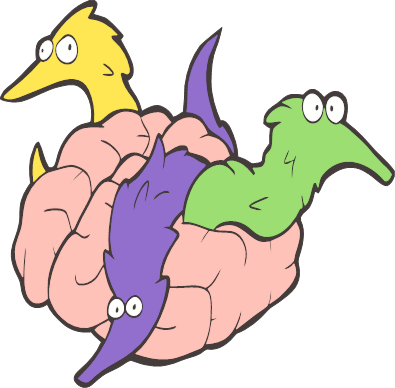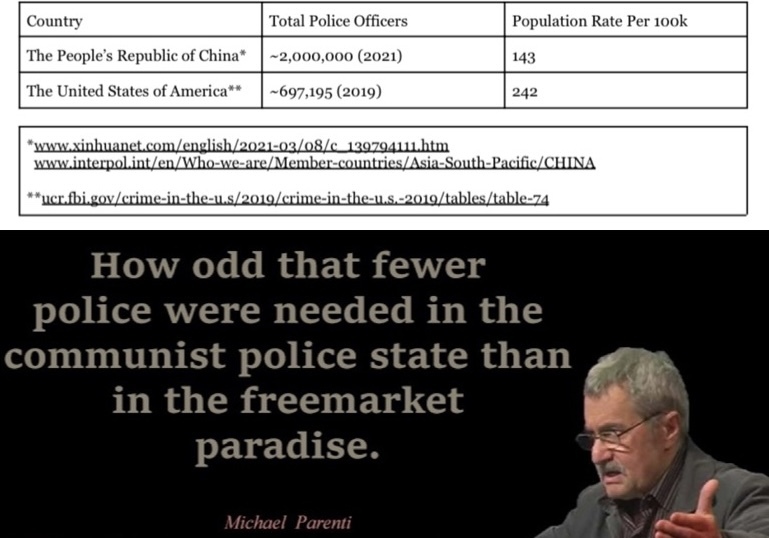

robinn2 [he/him]
ML☭
“Political satire became obsolete when Henry Kissinger was awarded the Nobel peace prize” — Tom Lehrer
robinn but with style (I forgot my password after the great migration massacre)
- 2 Posts
- 12 Comments
- robinn2 [he/him]@hexbear.nettoMemes@lemmy.ml•Android vs IOSEnglish39·1 year ago
Why are you presuming liberals are dumb? Liberal societies are functioning in the real world while the most successful attempts at socialism are those that moved towards hybrid economies (Vietnam and China).
The case of Vietnam and China is well-explained in Chinese Marxist economic study and experience (not that you would know this), as Primary Stage Socialism. To explain this, it’s necessary to look at the history of these two countries. Before Vietnam emerged under modern socialist-orientation it was being pillaged by French then Japanese then French (again) colonialism; the French were overthrown by the Vietnamese, with France receiving support for some time from America until the U.S. decided they wanted the territory for themselves, where they bombed the country emerging just out of colonialism into oblivion, killing 1M+ for their resources until they were forced out, then employing sanctions and IMF pressure afterwards. This is clearly not an orthodox path of economic development and not conducive to a balanced test of economic competition that you’re implying. You of course know of China’s underdevelopment under semi-feudalism and semi-colonialism prior to socialist-orientation (with U.S. support for the KMT as the communists won the civil war).
Now I didn’t think I’d have to explain this, but the Marxist analysis isn’t “state ownership is good at all times and private ownership is bad at all times”; first there’s the question of class orientation of the state, tearing apart this ridiculous “mixed economy” nonsense, which is really just a method of obscuring this fact and simplifying economics into a ratio of (private/”public”, with both metrics gaining new context under different orientations of the class dictatorship, especially the latter). You cannot simply fully nationalize a drastically underdeveloped economy (nor is this the traditional socialist/Marxist prescription, with Engels stating for instance in Principles of Communism, “Will it be possible for private property to be abolished at one stroke? No, no more than existing forces of production can at one stroke be multiplied to the extent necessary for the creation of a communal society. In all probability, the proletarian revolution will transform existing society gradually and will be able to abolish private property only when the means of production are available in sufficient quantity.”
Scientific socialism is specifically the approach that states that different scales of production demand different and mirrored relations of production which then determine the social relations of that society. Separate forms and scales of production demand the supremacy of separate emerging and progressive classes (just as feudalism nurtured and birthed the early bourgeoise to overthrow it, so that same bourgeoisie will eventually nurture its own successor, the proletariat, by virtue of the socialization of production and the decay of the capitalist mode of production). Primary Stage Socialism is specifically a new concept created by Deng Xiaoping to flesh out an understanding of the development of socialism on an underdeveloped platform. The basic explanation is that in developed countries there will be large-scale capitalist production, then revolution, then advanced socialism, whereas in artificially underdeveloped countries there will be revolution, then the development of large-scale capitalist production, then advanced socialism. The common enemy of imperialism nullifies the singular revolutionary character of the national bourgeoisie and, with the masses gaining new understanding from this experience, the dictatorship of the proletariat (typically headed by the proletariat with a mass base of the peasantry, as in China’s PDD). The objective under this new governance is to “modernize” the forces of production (by utilizing foreign investment, the patriotic national bourgeoisie, and market relations) so that they may correspond to this progressive class leadership and under this progressive class leadership as well as build the framework for socialist relations of production (directly state owned economy is still dominant in China). This isn’t some smashing rebuttal of socialism, nor is this “total/vs. mixed economy” nonsense anything other than a false dichotomy. These nations assumed this theory and practice because it is the correct approach (and not in the revisionist sense of abandoning Marxism-Leninism), and this notion of failure of socialism is a complete misunderstanding.
As for liberalism, it works for the bourgeoisie, is the ultimate ideology of the bourgeoisie undercutting all obstacles of outdated social (and economic thought to an extent) thought that hinders the bourgeoisie while uplifting this group and maintaining their select privileges. The vast majority of those ascribing to “liberalism” as an ideology do not belong to the select privileged group for which the ideology is oriented, and are defending demonstrably incorrect incorrect ideas with relation to the “second” and third world and upholding the pretexts of the dominant class not as a matter of sly infiltration but genuine mistaken belief (and the person you were replying to never stated that all people who uphold liberalism are genuinely confused or dumb, but that they had been arguing with those who are (talking incorrectly and against their ultimate interests). The misnomer of liberal societies “functioning” lies in the fact that “functioning” is seen as a blind metric (success/failure) rather than a relative idea (with certain modes functioning for certain groups, usually for those by which they were designed and carried out). China has been growing at a much faster rate than “liberal societies”, and is doing so without engaging in imperialism and massacring millions of people for regional influence and natural resources. Your entire critique is useless.
- robinn2 [he/him]@hexbear.nettoGenZedong@lemmygrad.ml•Approaches to Disaster ReliefEnglish3·1 year ago
- robinn2 [he/him]@hexbear.nettoGenZedong@lemmygrad.ml•Strange Xinjiang Videos, Is this a psyop or just very poor outreach?English5·1 year ago
Examples?

Also the U.S. has the highest number of prisoners on earth (in both proportion and totality). Bad countries are authoritarian though, good countries (the U.S. in this case) are wholesome teddy bears that just happen to use s-x slavery in their occupied bases, kill millions of people, lie about their real motives, torture innocents (with Guantanamo Bay still open)and gun down dissidents in other countries because they were just trying too hard to bring democracy to the hordes who begged for U.S. “charity.” We’ll do better next time guys!
- robinn2 [he/him]@hexbear.nettoBlahaj Lemmy Meta@lemmy.blahaj.zone•Can we defederate from hexbear.net?English4·1 year ago
Removed by mod
- Read “Monopoly Media Manipulation”
- Read “Brainwashing”—and since you immediately dismissed my well-sourced and thoroughly explained response to your “death camps in north kora” (lmao) comment with the thought terminating “they’re defending north korea so I’m right” cliche, read “Masses, Elites, and Rebels” as well
- Read Parenti’s Inventing Reality
- Read Chomsky’s Manufacturing Consent
"The ideas of the ruling class are in every epoch the ruling ideas, i.e. the class which is the ruling material force of society, is at the same time its ruling intellectual force. The class which has the means of material production at its disposal, has control at the same time over the means of mental production, so that thereby, generally speaking, the ideas of those who lack the means of mental production are subject to it. The ruling ideas are nothing more than the ideal expression of the dominant material relationships, the dominant material relationships grasped as ideas” - Karl Marx
You still haven’t explained how America is “learning from their mistakes”, or given any proof that they’ve stopped their imperialist pursuits (much less actually refuted my example of Yemen), haven’t apologized for your cowardly defense of the War in Afghanistan (and of course didn’t address the examples of horrific atrocities committed by the U.S. which @sunset linked), nor addressed really anything I said on this except for a single comment where you made an idiotic argument about “one party” with no understanding of Afghanistan’s political realities (or really anything for that matter). Stop acting smug you awful chauvinist cracker.
I even spelled it wrong and still found it, lol.
HRW is a U.S. government puppet “NGO” with no credibility outside of the West. Secondly, the UN document is based entirely on defector testimony, which has been thoroughly called into question and proven to be unreliable due to manipulation by the ROK. The state jails people who talk positively about the DPRK, including defectors, mainly through the National Security Law(Kraft, South Korea’s National Security Law), and pays defectors exorbitant amounts of money for atrocity propaganda. I’ll put it simply with a quote from Fanon’s The Wretched of the Earth: “For the colonized subject, objectivity is always directed against him.”
Bush wanted revenge for the assassination plot against his dad by Sadddam and a think tank tried to justify it with bringing democracy to Iraq.
I’m sorry but this is a childish explanation for the war in Iraq and has no material foundation. The president cannot be the only person in support of a war of this scale for it to go through, you need converging interests. Yes it’s correct the war was a continuation of Bush Sr.’s policies but that does not mean that Bush’s feelings were the only or main reason for it (and no evidence this is the case of course).
Everyone is ready for democracy. I believe everyone is capable of choosing to fight for democracy. The fact is people in Afghanistan choose not to fight for their democracy. Their military accepted bribes from the Taliban and the citizens did not rise up in response. I watched the news, it happened very quickly.
I do not care that you “watched the news.” America was NOT fighting for democracy in Afghanistan (I explained this and cited sources, apparently no need to reply to this). The Taliban was an anti-democratic American creation through the Mujahideen. Read Chomsky’s Manufacturing Consent on why “watching the news” isn’t adequate.
We need to learn from our mistakes. We need to do better. Throwing our hands and giving up because of moral issues is not helpful.
Maybe the nation that inspired Nazi Germany and was built on racism and exclusionary liberation, that killed a million in Indonesia and [3.3 million in Korea, millions in Laos, 2.4 million in Iraq, etc.] and used Korean women for s-xual slavery en masse (Patriots, Traitors, and Empires, p. 33) is not some sweet teddy bear that “made some mistakes.” Maybe reform isn’t the answer. Maybe the U.S. isn’t endeavoring to “do better” (they’ve been quite successful in their goals, and I’ve yet to see any proof of good intention from the U.S.), and maybe these “moral issues” are indicative of a larger issue. Nobody is “learning from their mistakes.” The U.S. military is as violent as ever, helping Saudi Arabia carry out a genocide in Yemen with military support for instance. Where is this apologetic sweetheart you see? Fuck America and fuck everything it stands for. They haven’t even apologized for half of this shit.
Your reply barely addresses anything lmao.
You know that there are death camps in North Korea to this day right? Where as [sic] South Korea does not have any death camps.
Wow! I am shocked and appalled! May I have an article to read on this startling atrocity?
One party systems are not democracy [sic]
Democracy is entirely empty when there is no rule by the majority (i.e. class rule, of which the U.S. is ruled by an economic minority that decides candidacy under the illusory pretext of multiparty competition). The multiparty system by itself is not a guarantee of democracy nor is it the only system of democracy. There can be competing ideas within a party (especially a mass party as the PDPA), and party rule does not negate elections to party positions and mass participation. This is much more a slogan that completely misunderstands different political realities than an actual point. Terrible response to my multitude of points on Afghanistan, although I don’t know if you’re capable of anything else. Under the PDPA, equal rights for women, land reform, and public healthcare were established (Against Empire, p. 57). The king and autocracy were overthrown, labor unions were legalized, women were allowed to read and hold government positions and began literacy programs alongside poor peasants. The U.S. undid all of this by supporting terrorists and committed atrocities in order to ensure their own interests (yay democracy!).
This is a straw man. I don’t agree with the war in Iraq. Read my comments if you don’t believe me.
When you wrote that you “think what [the U.S. government] learned from Afghanistan and Iraq is that democracy cannot be forced.” This, in my view at least, clearly implies that the U.S. government was fighting in Iraq for democracy. Feel free to give me an alternate interpretation.
Democracy cannot be forced. If people don’t fight to defend it, it will be taken away.
This is a fine platitude, but not what I was addressing. I was specifically noting your comments I just mentioned on how these pursuits failed because “democracy cannot be forced”, i.e. the U.S. was “forcing democracy” where people were not ready for it. I categorically reject that U.S. FP is oriented towards democracy (and you’ve done nothing to prove it is), and think it is absolutely disgusting to say that this is what the U.S. needs to “learn from", that the people simply “weren’t ready” for our good will and hospitality in the form of bombs and torture. It’s whitewashing nonsense.
@GarbageShoot addressed everything else and debunked it, but I want to talk about this:
I don’t need to defend ever [sic] single thing the US has done wrong or what you think the US has done wrong to enjoy and understand the benefits of democracy. US is certainly not perfect [sic] but it beats living in a dictatorship that’s for sure. I want the US to support and defend democracies.
This sort of nonsense of dismissing all anti-democratic actions by the U.S. government (ex. below) by saying “I don’t need to defend everything” is absurd and ignorant.
- the insertion of the dictator Syngman Rhee in south Korea; the support for the ROK’s government as it placed 188k people in prison for sympathizing with socialism/communism (Korea’s Place in the Sun, p. 349), put 70,000 leftists in concentration camps (Korea’s Place in the Sun, p. 223), and massacred tens of thousands in Jeju for protesting; the undemocratic and uneducated division of Korea (Patriots, Traitors and Empires, p. 73), etc.
- inciting terrorism and supporting Nazi “stay behind” troops in countries with communist resistance movements (Italy, Greece, Germany, Turkey, etc.) with the intention of pinning this terrorism on communist movements and tricking the population into voting for the U.S.-backed parties (see Paul L. Williams’ Operation Gladio)
- the support for the coup by dictator Pinochet against the popularly elected Allende in Chile
“I don’t see why we need to stand by and watch a country go communist due to the irresponsibility of its people. The issues are much too important for the Chilean voters to be left to decide for themselves” - Kissenger
- every single action in the Cold War that subverted democratic principles (see The Jakarta Method)
There comes a certain point when the “democracy” thesis must be questioned; in which U.S. military intervention did America “fight for democracy”? You’ve brought up Iraq and Afghanistan. What evidence is there that these were genuine pursuits for democracy? Afghanistan HAD democracy under the DRA, but the U.S. decided to undermine social reform in the country to supplant Soviet influence in the Middle East:
“The United States’ larger interest…would be served by the demise of the Taraki regime, despite whatever setbacks this might mean for future social and economic reform in Afghanistan… The overthrow of the DRA [Democratic Republic of Afghanistan] would show the rest of the world, particularly the Third World, that the Soviet’s view of the socialist course of history as being inevitable is not accurate” (US State Department memorandum reproduced in Cockburn and St. Clair’s Whiteout, pp. 262–63).
We know that the lie of support for the Mujahideen being afforded by the U.S. merely to push back against Soviet invasion is false, since the U.S. admitted to supporting the Mujahideen at least half a year before the invasion (US Foreign Policy and the Soviet-Afghan War, Lowenstien). The volatile conditions in Afghanistan are the exact result of the U.S. fathering the Taliban for influence in the region, and the intervention in Afghanistan had no democratic results apart from furthering U.S. interests (and U.S. corporate oil interests, see Parenti’s “Afghanistan: Another Untold Story”), which were decidedly undemocratic. By the way, the U.S. is still starving people in Afghanistan.
And Iraq, this MUST be the single democratic war fought by the U.S. right? Apart from killing more people than Saddam ever did (and this is of course excluding that the U.S. supported Saddam as he gassed Iran)., giving children birth defects and cancer from depleted Uranium, s-xually abusing and torturing prisoners in Abu Ghraib, and so on, the effect was merely “democratizing” (giving to western corporations) Iraqi oil shares. And one of your pig-dogs already admitted to the war being an imperialist bid for oil and not “democratic”:
“People say we’re not fighting for oil. Of course we are. They talk about America’s national interest. What the hell do you think they’re talking about? We’re not there for figs” - Chuck Hagel, U.S. Senator (1997-2009) and U.S. Secretary of Defense (2013-15)
Say that bs “oh I guess they weren’t ready for democracy” nonsense again I dare you. You don’t deserve to prance around these topics and “learn” by defending horrific atrocities and seeing what responses you get.
- robinn2 [he/him]@hexbear.nettomain@midwest.social•What's the deal with Hexbear?English742·1 year ago
Also Parenti’s Inventing Reality and “Monopoly Media Manipulation” and Roderic Day’s “Brainwashing” [Pt.1] & [Pt. 2]